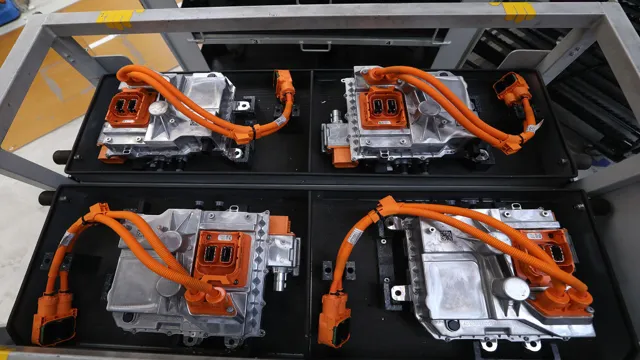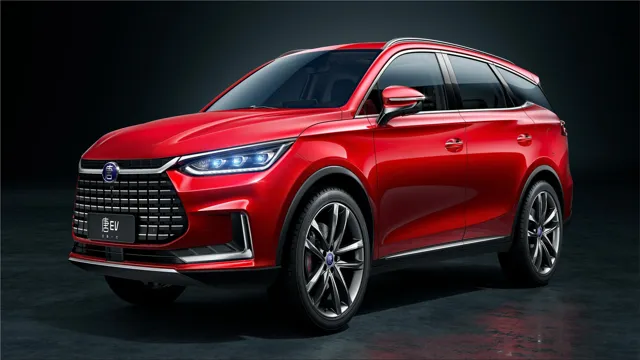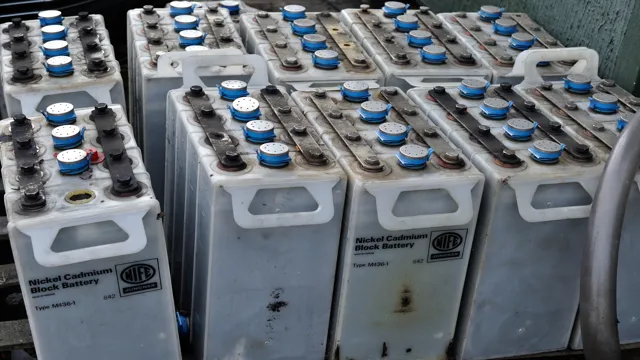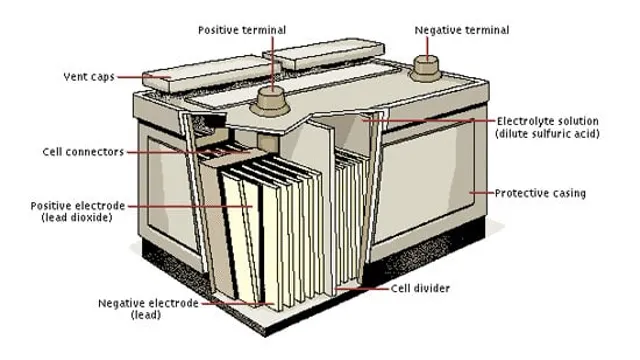Unraveling the Mystery of Electric Car Battery Capacity: Everything You Need to Know About Ah
Are you curious about the capacity of an electric car battery, specifically in AH? As electric cars become more prevalent, one of the most common questions asked is how long their batteries will last and how far they can go. The answer lies in the battery’s capacity, which is measured in ampere-hours (AH). The AH rating indicates how much electrical energy the battery can store, which directly affects how far an electric car can travel before needing to recharge.
The higher the AH rating, the longer the vehicle can travel. However, a higher AH rating also means a larger and heavier battery, which can affect the car’s performance and handling. Understanding electric car batteries and their AH rating is vital for any potential electric car owner.
It can help you make an informed decision about the range and performance your car will have, as well as the charging options and costs. In this blog, we’ll explore the key aspects of the electric car battery capacity in AH, so you can be prepared when it comes to choosing your next vehicle.
What is AH?
The electric car battery capacity is measured in ampere-hours (Ah) which is an important factor to consider when buying an electric vehicle. The higher the Ah rating, the longer your vehicle can travel on a single charge. Simply put, Ah is a unit of measurement that shows how much energy the battery can store and deliver.
A higher Ah rating indicates that the battery has more capacity to store energy and can run for longer, similar to a bigger gas tank in a traditional car. It’s important to note that while a higher Ah rating is ideal, it can also increase the weight and price of the battery. Therefore, finding a balance between capacity and cost is crucial when selecting an electric car battery.
Always make sure to check the manufacturer’s specifications to ensure that the battery you choose is compatible with your vehicle.
Explaining Amp-Hours
AH, or Amp-hours, is a unit of measurement used to describe the energy storage capacity of a battery. It is a measure of how much energy a battery can store and deliver when it is fully charged. AH is calculated by multiplying the current, measured in amps, by the time in hours for which the battery can deliver that current.
In other words, if a battery has a capacity of 100 AH, it can deliver a current of 1 amp for 100 hours, or a current of 10 amps for 10 hours, before it is fully discharged. Understanding AH is crucial when choosing a battery for your needs, whether it is for a small device or a large renewable energy system. It helps you determine how long the battery will last and how much energy it can provide.
So, the next time you are in the market for a battery, don’t forget to check its AH capacity to ensure it meets your requirements.
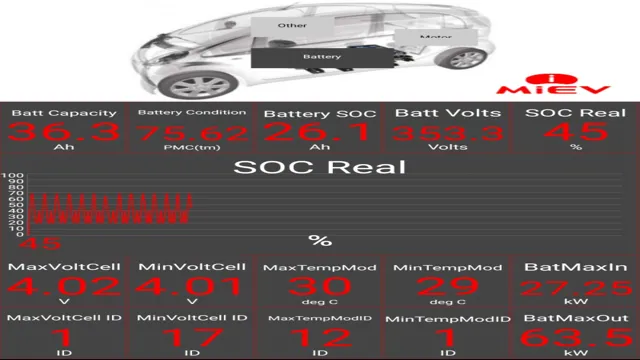
Importance of AH in Electric Cars
When it comes to electric cars, the battery is a crucial component that powers the vehicle. The battery’s capacity is measured in ampere-hours (Ah), which denotes the amount of charge it can store. The importance of Ah in electric cars lies in the fact that it directly influences the car’s range.
A higher Ah rating means that the car’s battery can store more power, allowing it to travel further before needing a recharge. This is particularly important for drivers who frequently undertake long journeys. Additionally, Ah rating affects the speed at which the car can charge.
A higher Ah battery will generally take longer to charge, but will also last longer before needing another recharge. When choosing an electric car, it’s important to consider the battery’s Ah rating to ensure that it meets your needs.
Range and Battery Capacity
When it comes to electric cars, the range and battery capacity are two critical factors to consider. However, the importance of AH (ampere-hours) in electric vehicles cannot be overlooked. AH is the measure of the amount of energy a battery can store and deliver.
In simpler terms, the higher the AH rating of a car battery, the longer the range of the electric vehicle. Therefore, when you are shopping for an electric car, it’s essential to pay attention to the AH rating of the battery. It is worth noting that a higher AH rating also means a higher price tag.
However, it is a tradeoff that is worthwhile, especially for frequent travelers who need a reliable and efficient electric car. Therefore, when considering the range and battery capacity of an electric car, it’s wise to factor in the AH rating too.
Charging Time
When it comes to electric cars, one of the most important factors to consider is the battery’s capacity, measured in Ampere-hours (AH). This rating tells you how much energy the battery can store, and therefore, how far your car can go on a single charge. The higher the AH rating, the longer the range; however, this also means a longer charging time.
As such, it’s important to strike a balance between range and charging time. A car with a large battery may be perfect for long drives, but if you’re mainly using it for short commutes, a smaller battery might be more practical, as it will need less time to fully charge. Ultimately, the AH rating of your car’s battery will depend on your usage habits and driving needs.
By taking this into account, you can make sure your electric car is optimized for both performance and convenience.
Examples of Electric Car Battery Capacity
When it comes to electric car battery capacity, it can seem a bit overwhelming trying to keep up with all the various options. One common measurement used to describe battery capacity is ampere-hours, or Ah for short. For example, the Nissan Leaf has a battery capacity of 40 kWh, which translates to roughly 147 Ah.
The Tesla Model S, on the other hand, has a battery capacity ranging from 75 to 100 kWh, which equates to anywhere from 277 to 370 Ah. Of course, the size of the battery pack isn’t the only factor determining an EV’s overall range – factors such as aerodynamics, driving habits, and weather conditions all play a role as well. However, knowing the battery capacity of different electric cars can help you determine which one might be the best fit for your lifestyle and needs.
Tesla Model S: 100 kWh
Electric car battery The Tesla Model S is a great example of the improved battery capacities being seen in the electric car world. With a 100 kWh battery pack, it has a range of up to 402 miles, making it one of the most powerful electric cars on the market today. Of course, not every electric car will have a battery pack as large as the Model S, but batteries are becoming more powerful overall.
For example, the Nissan Leaf features a 62 kWh battery pack that is capable of traveling up to 226 miles on a single charge. And the Chevrolet Bolt has a 66 kWh battery pack with a range of up to 259 miles. As you can see, the capacity of electric car batteries is becoming more and more impressive, allowing drivers to travel farther without needing to stop and recharge as often.
So, if you’re considering an electric car, don’t overlook the importance of battery capacity when it comes to range and overall performance.
Nissan Leaf: 40 kWh
The Nissan Leaf is a popular electric car that boasts a 40 kWh battery capacity. This means that the car’s battery can store up to 40 kilowatt-hours of energy, which is used to power the car’s electric motor. But what does this actually mean for the driver? Well, a larger battery capacity means that the car can travel further on a single charge.
In the case of the Nissan Leaf, it can travel up to 150 miles on a single charge. Of course, this will vary depending on driving style, ambient temperature, and other factors. But in general, a larger battery capacity means less range anxiety and more freedom to explore.
So, if you’re in the market for an electric car, it’s worth considering the battery capacity as one of your main factors in the decision-making process.
Chevrolet Bolt: 66 kWh
Electric car battery capacity Electric cars are becoming more and more popular as people realize the benefits of reducing emissions and saving money on fuel costs. One essential component of an electric car is its battery, which stores the energy that powers the vehicle. The size of the battery, measured in kWh, determines how far the car can travel on a single charge.
One example of an electric car with a battery capacity of 66 kWh is the Chevrolet Bolt. This means that the Bolt can travel up to 259 miles on a single charge, making it an excellent option for those who want to go on long trips without worrying about running out of power. Other electric cars, such as the Tesla Model S, have even larger battery capacities, allowing them to travel even further before needing a recharge.
As technology improves, it’s likely that we’ll see even bigger and more efficient batteries in electric cars, making them an even more reliable and convenient choice for drivers.
Conclusion
In conclusion, the capacity of an electric car battery is a critical component that determines the distance you can travel on a single charge. As a wise person once said, ‘the higher the ah, the farther you can go – and who doesn’t love a good road trip without any range anxiety?’ So, next time you’re in the market for an electric car, be sure to pay close attention to the ah of the battery, and don’t be afraid to go the extra mile (or two..
.or three).”
FAQs
What is the typical electric car battery capacity in Ah?
The typical electric car battery capacity can range from 30 Ah to 100 Ah, depending on the make and model of the car.
How does the battery capacity affect the range of an electric car?
The battery capacity determines the amount of energy that can be stored in the car, which directly impacts the range of the car. Generally, a higher battery capacity will provide a longer range.
Can you upgrade the capacity of an electric car battery?
In most cases, the battery capacity of an electric car is not upgradeable. However, some car manufacturers offer options to upgrade the battery at the time of purchase.
How long does it take to charge an electric car with a certain battery capacity?
The charging time of an electric car depends on the battery capacity and the charging speed of the charging station. Generally, a higher battery capacity will take longer to charge. With a Level 2 charging station, a 60 Ah battery can take around 4-6 hours to charge fully.

